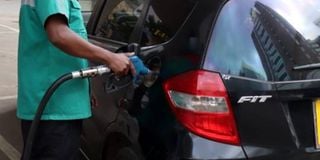Why oil pump prices are expected to drop in new review today

A pump attendant serves a customer at a petrol station in Nairobi.
What you need to know:
- The new prices will factor in the shilling’s strong rally against the dollar.
- A litre of super petrol has dropped by Sh18.21 from December to the current price of Sh199.15 in Nairobi.
Petroleum pump prices are expected to drop further from Sunday midnight on a combination of a strong shilling and a drop in global crude prices last month.
The Energy and Petroleum Regulatory Authority (Epra) will today release the monthly pricing schedule to May 14, with the regulator largely expected to cut the price.
The new prices will factor in the shilling’s strong rally against the dollar last month when it averaged 137 units to the greenback while the highest was 143.9 units last month, rates which were lower than the exchange rate of 148.02 units to the dollar used in setting the current prices. The highest prices for Murban crude oil and Brent crude were $87.37 per barrel (Sh12,572.54) and $87.23 (Sh12,552.39) per barrel respectively in the global market last month.
These factors directly impact the landed cost of refined fuel given that the dollar is the currency of payment for fuel imports while Epra uses Murban crude as the benchmark for setting pump prices.
A litre of super petrol has dropped by Sh18.21 from December to the current price of Sh199.15 in Nairobi while that of diesel has fallen by Sh13.09 to Sh190.38 in the same period. A litre of kerosene has dropped by Sh14.32 to Sh188.74 in the same period.
“Banks are confirming Letters of Credit at Sh133 to the dollar and that will be passed on to consumers at the pump,” Energy Cabinet Secretary Davies Chirchir said three weeks ago.
Letters of credit are part of the government-backed importation of fuel on credit and are used by the Treasury to assure exporters and banks that payment obligations will ultimately be met.
Kenya has since March last year been shipping fuel from Saudi Aramco, Emirates National Oil Company, and Abu Dhabi National Oil Company on a credit period of 180 days.
Galana, Gulf Oil, and Asharami & One Petroleum are the local firms tapped to import fuel on behalf of the industry.
“We expect pump prices to come down on April 15 on account of the exchange rate and the March global prices being applied,” said an oil executive.
The anticipated drop at the pump will further ease inflation from the 5.7 per cent posted last month. It was 6.3 per cent in February.
The Kenyan economy is diesel-driven with goods manufacturers and service providers factoring in the cost of fuel while setting prices of their goods and services.
Epra applied an exchange rate of Sh148.02 to the dollar and $77.68 (Sh 11,498.19) per barrel of murban crude while setting the current pump prices that will lapse at midnight.
But the shilling rallied against the dollar to close at Sh132.31 to the dollar on the last day of trading last month, setting the stage for a significant impact on pump prices based on the exchange rate alone.
Murban crude prices were also lower last month compared to the current rates of $87.37 per barrel and $87.23 per barrel of Brent crude.
In the pricing schedule announced on March 14, a litre of super petrol dropped by Sh7.21 and Sh5.09 for that of diesel in Nairobi. The cost of kerosene fell by Sh4.49 in the period.
The drops were the biggest month-on-month drop since May 2020, significantly cushioning Kenyans and helping ease inflation.
But Sunday’s review is likely to be the last that Kenyans will enjoy cheap fuel, as prices are projected to increase from May at the earliest.
The anticipated rise has been attributed to a combination of the escalation of the Israel-Hamas war which is likely to draw in Iran— one of the biggest exporters of fuel in the world— and looming supply cuts by Mexico.




